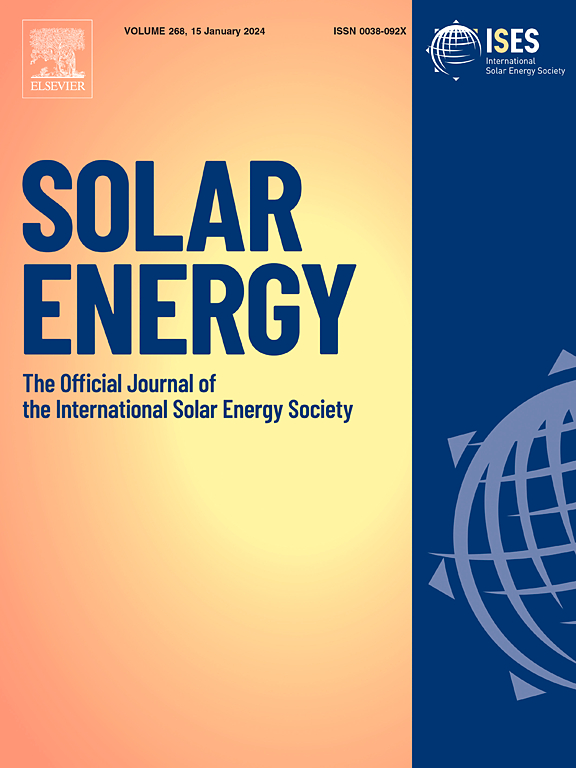Effects of insert design and optimization on the performance of parabolic trough receivers with inserted absorbers
IF 6
2区 工程技术
Q2 ENERGY & FUELS
引用次数: 0
Abstract
To address the non-uniform heat flux density characteristics of parabolic trough solar collectors (PTSCs), an innovative insert (composed of vortex generator, VG) layout scheme is introduced in this study. Under turbulent conditions, an analysis is conducted on the thermal performance of three different placement strategies (uniform distribution, UD, directional distribution-1, DD-1, and directional distribution-2, DD-2), including the calculation of Nusselt numbers, drag coefficients, and thermal enhancement factors. The results indicate that VG can induce paired vortices, and the position, intensity, and quantity of vortices are closely related to the shape of VG. Based on the direction of vortex flow, the flow field is divided into collision area (CA) and pushing area (PA). In the CA, vortices collide with each other, consuming turbulent energy and reducing local heat transfer efficiency. In the PA, the direction of vortice motion is opposite, which can achieve efficient local heat efficiency. In the three VG cases, the DD-2 configuration can induce non-uniformly distributed high-intensity mixed vortices and further achieve the demand for heat transfer enhancement in the area of high heat flux density through the ejection and sweeping movements of these vortices. In all investigations, DD-2 configuration can achieve an improvement in heat transfer rate ranging from 1.5 to 2.12. In terms of heat transfer performance (), the ψ value of DD-2 is 1.37 at N = 4 and Re = 20,000. Besides, the thermal performance of the tube with insert is analyzed through entropy generation.
插入式设计和优化对带有插入式吸收器的抛物槽接收器性能的影响
针对抛物面槽式太阳能集热器(PTSC)热通量密度不均匀的特点,本研究引入了一种创新的插入式(由涡流发生器组成,VG)布置方案。在湍流条件下,对三种不同布置策略(均匀分布,UD;定向分布-1,DD-1;定向分布-2,DD-2)的热性能进行了分析,包括努塞尔特数、阻力系数和热增强因子的计算。结果表明,VG 可诱发成对涡流,涡流的位置、强度和数量与 VG 的形状密切相关。根据涡流的流动方向,流场被分为碰撞区(CA)和推动区(PA)。在碰撞区,涡流相互碰撞,消耗湍流能量,降低局部传热效率。而在 PA 区,涡流运动方向相反,可以实现高效的局部热效率。在三种 VG 情况下,DD-2 配置可诱导非均匀分布的高强度混合涡流,并通过这些涡流的喷射和横扫运动进一步实现高热流密度区域的传热增强需求。在所有研究中,DD-2 配置可实现 1.5 至 2.12 的传热率改进。就传热性能(ψ)而言,在 N = 4 和 Re = 20,000 条件下,DD-2 的ψ值为 1.37。此外,我们还通过熵的产生分析了带内衬管的热性能。
本文章由计算机程序翻译,如有差异,请以英文原文为准。
求助全文
约1分钟内获得全文
求助全文
来源期刊

Solar Energy
工程技术-能源与燃料
CiteScore
13.90
自引率
9.00%
发文量
0
审稿时长
47 days
期刊介绍:
Solar Energy welcomes manuscripts presenting information not previously published in journals on any aspect of solar energy research, development, application, measurement or policy. The term "solar energy" in this context includes the indirect uses such as wind energy and biomass
 求助内容:
求助内容: 应助结果提醒方式:
应助结果提醒方式:


